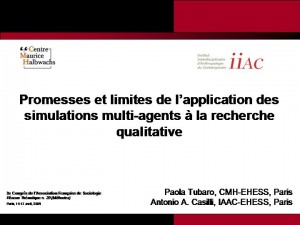Voilà la présentation powerpoint de l’intervention d’aujourd’hui au troisième Congrès de l’AFS (Association Française de Sociologie).
Ici de suite, quelques références bibliographiques utiles.
Axelrod R (1997) The Complexity of Cooperation: Agent-Based Models of Competition and Collaboration, Princeton, NJ: Princeton University Press.
Axelrod R (2006) Alternative Uses of Simulation. In: Harrison N (ed.) Complexity in World Politics: Concepts and Methods for a new Paradigm, Albany, NY: SUNY Press: 137-142.
Axtell RL (2000) Why Agents? On the Varied Motivations for Agent Computing in the Social Sciences, Working Paper 17, Center on Social and Economic Dynamics, Washington, DC: Brookings Institution.
Ballot G and Weisbuch G (2000) Applications of Simulation to Social Sciences, Paris: Hermes Science Publishing.
Becu N, Perez P, Walker A, Barreteau O and Le Page C (2003) Agent based simulation of a small catchment water management in northern Thailand: Description of the CATCHSCAPE model. Ecological Modelling, 170(2-3): 319-331.
Burawoy M (1998) The Extended Case Method. Sociological Theory, 16(1): 4-33
Chattoe E (2002) Computer Simulation of Family Practices. In: Carling A, Duncan S et Edwards R (eds.) Analysing Families: Morality and Rationality in Policy and Practice, London: Routledge: 268-282.
El Hadouaj S, Dragoul A and Espié S (2001) How to Combine Reactivity and Anticipation: The Case of Conflicts Resolution in a Simulated Road Traffic. In: Moss S and Davidson P (eds.), Multi-Agents-Based Simulation, Berlin, Springer, 82-96.
Epstein, J and Axtell R (1996) Growing Artificial Societies: Social Science From the Bottom Up, Cambridge, MA: MIT Press/Brookings Institution.
Geller A (2008) Growing Qawm: An Evidence-Driven Declarative Model of Afghan Power Structures, Advances in Complex Systems, 11(2): 321–335.
Gilbert N (2004) Quality, quantity and the third way. In: Holland J et Campbell J (eds.) Methods in development research: Combining qualitative and quantitative approaches, London: ITDG Publications: 141-149.
Gilbert, N (2007) Agent-Based Models. Quantitative Applications in the Social Sciences, London: Sage.
Hassan S, Pavon J, Arroyo M and Leon C (2007) Agent based simulation framework for quantitative and qualitative social research: Statistics and natural language generation. In: Proceedings of the ESSA’07: Fourth Conference of the European Social Simulation Association: 697–707.
Macy M and Willer R (2002) From Factors To Actors: Computational Sociology and Agent-Based Modeling, Annual Review of Sociology, 28(1): 143-166
Moss S (2008) Alternative Approaches to the Empirical Validation of Agent-Based Models. Journal of Artificial Societies and Social Simulations, 11(1) http://jasss.soc.surrey.ac.uk/11/1/5.html
Nowak A, Szamrej J, and Latané B (1990) From Private Attitude to Public Opinion: A Dynamic Theory of Social Impact. Psychological Review, 97 (3): 362-376.
Small C (1999) Finding an Invisible History: A Computer Simulation Experiment (in Virtual Polynesia). Journal of Artificial Societies and Social Simulation 2(3)
Troitzsch K (2004) Validating Simulation Models. In: Proceedings 18th European Simulation Multiconference: 98-106.
Yang L and Nigel G (2008) Getting away from numbers: Using qualitative observation for agent-based modelling. Advances in Complex Systems, 11 (2): 175-185.
Ziegler BP (1985) Theory of Modelling and Simulation, Krieger: Malabar.László Gulyás 2002 On the Transition to Agent-Based Modeling: Implementation Strategies From Variables To Agents. Social Science Computer Review 20(4): 389-. 399.
